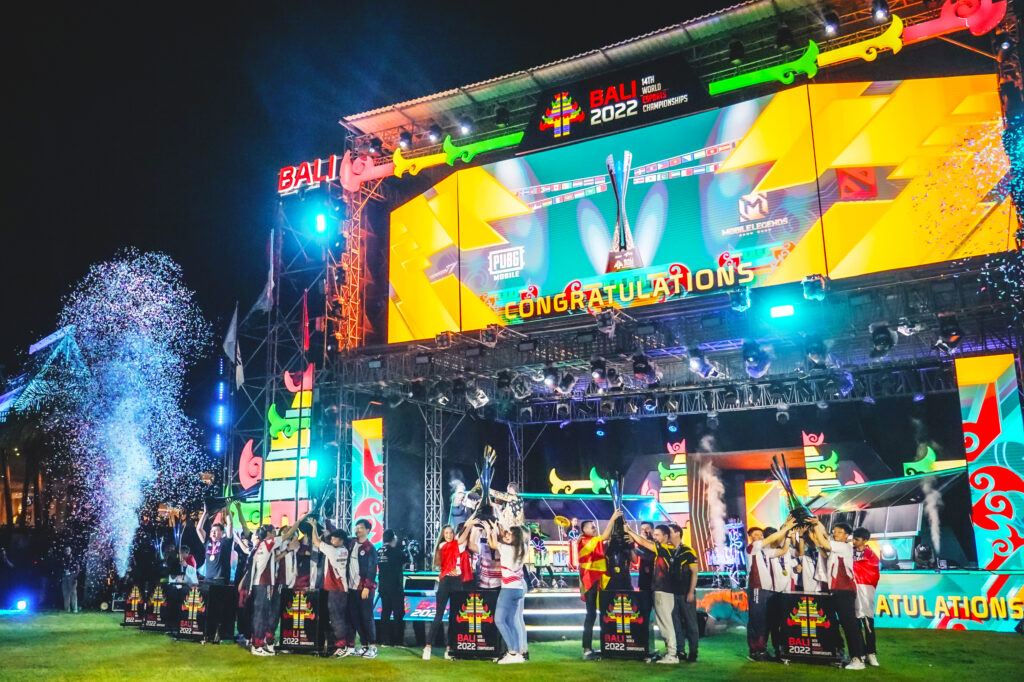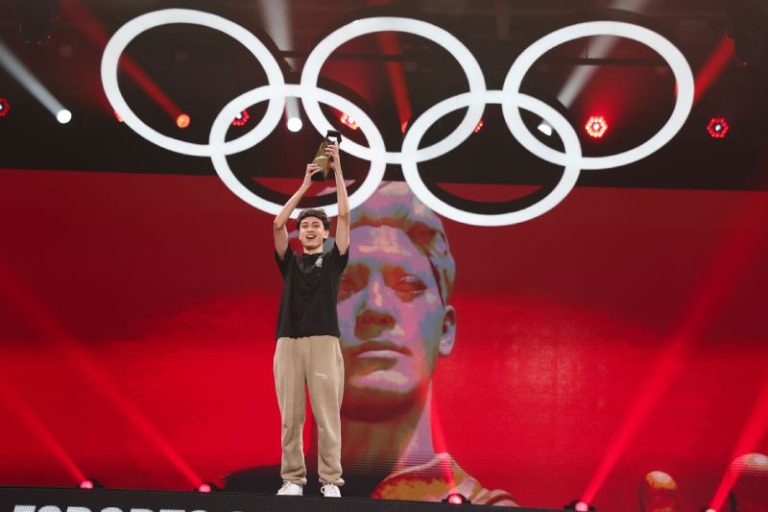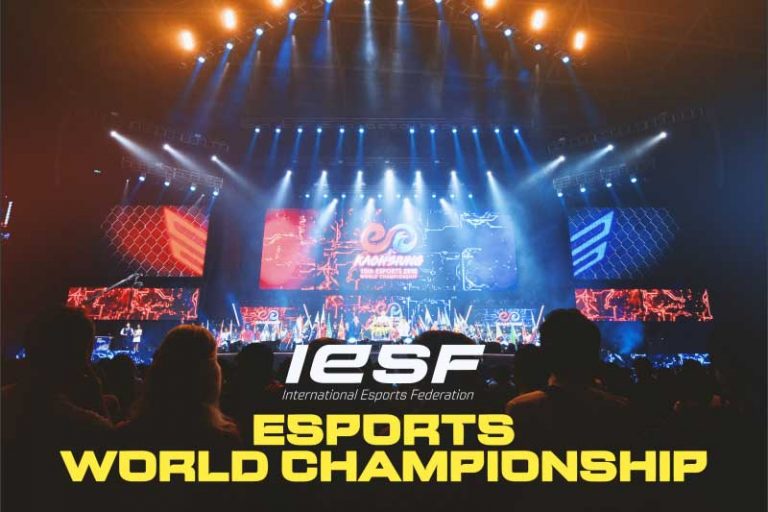Cities hoping to host the longest running Esports world championship event before 2027 have until April 30 to contact the International Esports Federation (IESF) to express interest. Earlier this month the IESF issued an open call to those cities considering staging the 2024, 2025 or 2026 World Esports Championships.

The IESF will host its 15th Championships in Iași, Romania starting August this year, an event that will break several records as the esports community and spectator interest continues to grow at a rapid pace.
About 130 nations are set to compete at this years’ event, IESF President Vlad Marinescu told GamesBids.com, and that number is up sharply from the most recent editions. Eilat, Israel staged the 2021 Championships with nearly 60 countries after the same city hosted a virtual event in 2020 during the COVID-19 pandemic. Last year Bali, Indonesia welcomed over 90 national teams to the 2022 event.
Online viewership is also rising with the 2022 event boasting more than 3 million watched hours and a peak concurrent stream of more than 671,000 people. Marinescu, who was officially elected president last December, said the success is due to recent steps taken including the expansion of the prize pool to $500,000, almost ten times previous editions.
“The numbers are incredible and growing constantly,” he said, adding that exposure, viewership and media evaluation has increased 20 fold. The numbers were also boosted by the inclusion of mobile games for the first time, according to Esports Charts that credited Mobile Legends: Bang Bang with the record breaking stream in the final between Philippines and Indonesia.
“We can see the number of interested cites that are seeking that exposure, and seeking that young vibrant community joining the city. So the demand is ever increasing. I think that some years ago it was difficult to find the next host, now we’re having a situation where we really have a selection process and very good bids from great cities.”
Rapid growth has not only facilitated, but also necessitated the need to allocate hosts years in advance.
“To build the requirements of an event that has been developing at a rapid, rapid rate is something that is constantly changing,” Marinescu, who also serves as Director General of the International Judo Federation (IJF) and is seven times American champion in Karate, said.
“So at the moment I think we are very comfortable with the level we’ve arrived to in the sense that we can allocate the next couple of editions. Also to keep the cities happy, to allow them to start working towards that goal in time, to come to the next edition and to have a good handover of knowledge.”
After the application deadline, the IESF will consult with prospective cities in May to review conditions, their proposals and to help finalize the bids.
The IESF has posted the hosting requirements online, and bidders will have to produce plans and provide the event and athletes with accommodations, transportation, hospitality, a competition venue, technology and infrastructure, medical services and other logistical elements required to successfully stage the event for almost 700 athletes plus support personnel. Cities can expect to benefit from exposure, economic impact, community involvement and legacy.
Marinescu told GamesBids.com that there is already interest in hosting future editions coming directly from countries, their sports ministries, the national federations and continental unions.
“And it’s because of the results we are showing regarding the media exposure; it’s because the diversity of the participants of the young community that are participating based on values of friendship, and peace, and unity,” said Marinescu.
“Breaking borders in the language of esports – which is a common language – and ultimately because it is a huge industry behind the event itself with the interest of promoting the city to that community, to those young people and generating the media exposure but also great stories and economic benefits later from tourism as well.”
After developing full bid proposals, they will go to the Executive Board and then the members where the final selection will take place.
The 2024 host city is expected to be revealed at the 2023 closing ceremony in Iași on September 4. No decision has been made on when the 2025 and 2026 cites will be selected and announced but Marinescu said there would be an advantage to name them early so they can benefit from the knowledge transfer from previous editions.
Upstart Global Esports Federation (GEF) that formed in 2019 and hosted its first “Global Esports Games” in Singapore in 2021 has already awarded its marquee tournament until 2026. Riyadh, Saudi Arabia is staging the annual event in December and China, United Arab Emirates and United States are set to host in 2024, 2025 and 2026 respectively. The 2022 Games were held in Istanbul.
GEF is backed by founding partner Tencent, the powerful Chinese digital entertainment and technology holding company that has a significant portfolio of game publishers. The organization has strong ties to the International Olympic Committee (IOC) through its leadership team and has agreements in place with Olympic sports federations and continental associations.
Both the IESF and GEF have wider aspirations, hoping to represent esports at major regional multi-sport events and the Olympic Games. Each organization claims to have about 130 nation members and applications have been made to the IOC to become the recognized governing body. The IESF’s Asian Confederation was behind the inclusion of esports for the first time as a medal event at the 2022 Asian Games in Hangzhou, China making it a key milestone for the sport’s entry into the mainstream.
Last year the GEF set up a key strategic partnership with the European Olympic Committees to further develop the sport, and have teamed up with the Commonwealth Games Federation to deliver the Commonwealth Esports Championships.
In December Marinescu said there was a need for “total unity” in the governance of esports after his organization offered to partner with the GEF just as it had done in 2021 with the Esports World Federation (ESWF) towards a single voice for gamers. The GEF continues to claim that it is the “authentic voice for the worldwide esports movement” according to its website.
Meanwhile, the IOC has signaled that it is unlikely to recognize either body anytime soon and has launched its own Olympic Esports Series to join the rapidly growing space. The IOC’s strategy has been to keep gaming in line with Olympic values and to integrate it with its other sports’ International Federations, resulting in an unusual collection of game titles that has alienated the popular gaming community. The Series will host competitions of ‘virtual sports’ including archery, baseball, chess, cycling, dance, motorsport, sailing, taekwondo, and tennis – most that don’t have a popular following among gamers who are more passionate about first-person shooter (FPS) or multi-player battle strategy games (MOBA).
IOC President Thomas Bach, an Olympic champion in Fencing, has said that the IOC would never consider giving a platform to a game that promotes violence.
Marinescu said the IESF uses a more strategic approach to selecting titles for the World Esports Championships, one that aims to deliver what the community wants. He said the games must be popular and inclusive and allow national esports federations the opportunity to field a competitive team.
“The game titles, being able to really have interest in all the different platforms from PC to console to tablet or mobile and through different genres of games allows this event to touch all communities of esports,” he said.
The games must “include the complete community,” Marinescu emphasized, meaning those gamers who play popular FPS and MOBA games such as CS:GO and DOTA 2 should be given the opportunity along with those who are more aligned with sports titles.
“Our target is exposure,” he added, “it’s enforcing the will of our national federations, and of our members, and the most important – protecting our athletes. That’s how we select the titles.”
“One of the most important roles of this organization in uniting people, and uniting national federations and the entire ecosystem. And more important than that it is assisting in the education and the cultural exchange and the values exchange, instilling principals – physical health, mental health, and socializing into the youth of he participants,” Marinescu said.
IESF announced this month that it will stage events at Iași 2023 for PUBG MOBILE, Mobile Legends: Bang Bang, CS:GO, Dota 2, Tekken 7, and eFootball.
Marinescu said the World Championship is more than a ten day event, and benefits for the host city will start months in advance with their name and branding being associated with national qualification events and continental qualifiers – and more than a million athletes.
“We’re talking about more than 3 months of exposure in all of those countries – of the partners, of the city, and of the values that we are trying to instill here,” he said.
“I believe with the World Championships with the host city which is our partner, with their wishes and their targets of hosting such an event – we are really able to prepare youth, instill them with pride, with respect, and with values, and portray them afterwards as leaders, heroes, idols and role models for all the gaming community, repeating and reverberating those messages of health and happiness.”

